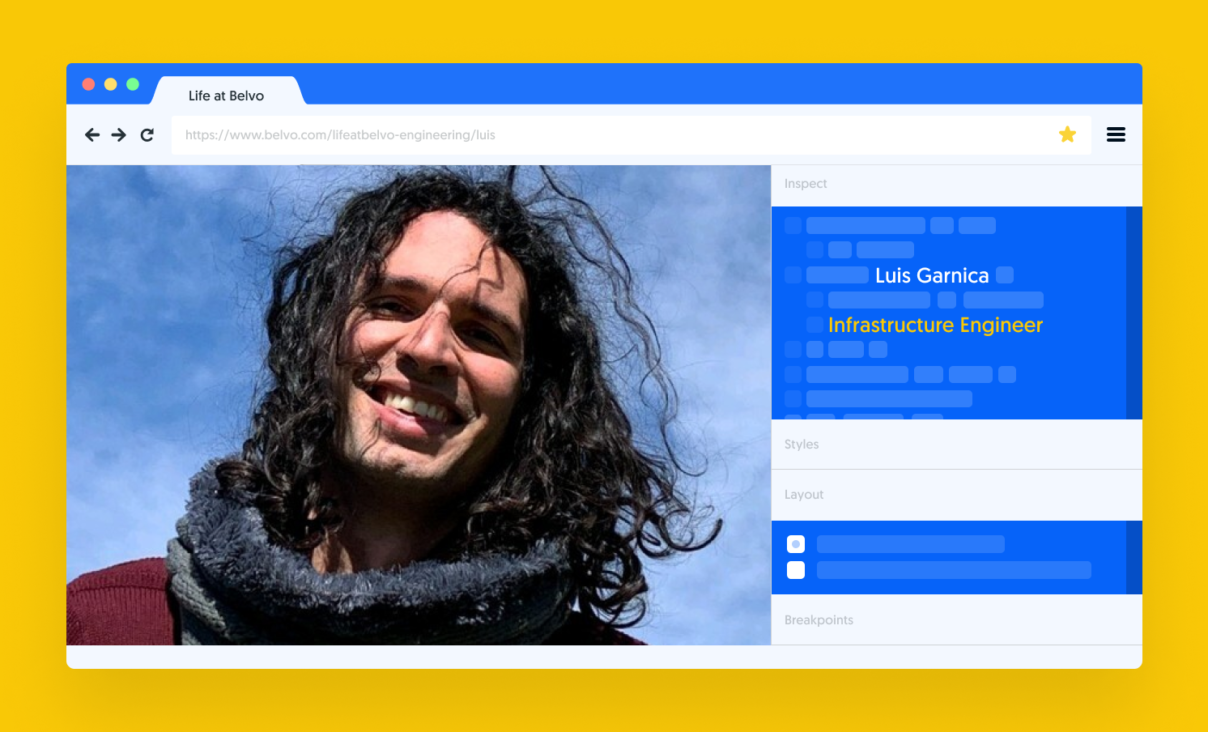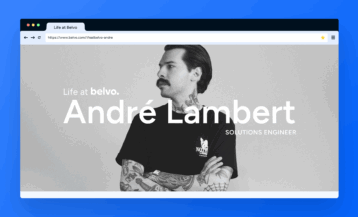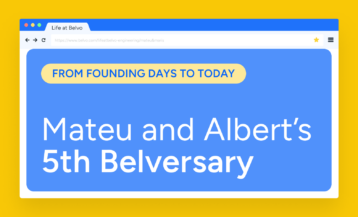Today we chat with Luis, Infrastructure Engineer at Belvo, about how his team works ‘behind the scenes’ to maintain the reliability of our API infrastructure.
Always there to lend a helping hand, or share positive thoughts with his teammates –whether that’s online or at the coworking office he frequently goes to in Madrid–, Luis Garnica is one of those people anyone would be lucky to cross paths with in an office.
As a DevOps Engineer at Belvo, he’s part of the Engineering team that takes care of maintaining our API infrastructure secure, resilient, and easy to use. Here, Luis shares some of the things he enjoys the most in his day-to-day life working at Belvo.
1. What do you do at Belvo?
I’m a Senior Infrastructure Engineer in Belvo as part of the Infrastructure team.
We lay down the cloud foundations that allow our developers’ “magic” to come to life in the form of a fantastic API that’s secure, resilient, and easy to use.
2. Can you describe your team’s mission and day-to-day responsibilities?
As a fintech startup, our mission is to have a finance-oriented cloud infrastructure bringing the best of two worlds: the security needed in the financial world and the agility of a tech startup. We ensure our developers are able to ship value to our clients (for instance, through new features) as fast as possible while maintaining best practices regarding security, reliability, scalability, traceability, and automation.
We also work hand in hand with other teams when we need to brainstorm on how to deploy new services using challenging technology.
3. What tech stack does your team use?
One of our core practices is having a reproducible infrastructure. So everything must be described in code through IaC (infrastructure as code) best practices. We deploy exclusively through IaC.
Our power tool here is Terraform (along with Terragrunt for painless multi-account management). AWS is our cloud where we rely as much as possible on managed services to not only offload maintenance tasks from the team, but also sleep peacefully knowing we’re using top-notch and battle-tested managed services.
Most of our services are dockerized so they run and scale in AWS ECS. For our pipelines, we use CircleCI since it is flexible and handles all of our use cases.
When we need to go above and beyond creating new automation, Python is the de facto language.
4. What are the tools that help you the most in your daily routine?
Definitely Slack helps in async communication, multitasking with reminders, and increased agility with the Jira integration.
5. How it is working with your team
Since we’re all aligned with the same vision and culture towards our craft, the dynamic is fast and frictionless.
Our team encompasses EMEA and LATAM timezones so we do a daily where we go over a quick recap of the tasks and issues we’ve been working on. If some member is having difficulties we also use these meetings to say so, then schedule a pair-ops and crush the problem together.
During the week, and when we complete a task or issue, we take some time to refine (if necessary) any issues in our backlog. Then, on Wednesday during our refinement session, we prioritize new issues and move them to our to-do stack so they’re ready to be worked on.
We’re currently using a cool Kanplan methodology by the way 😊
Any new change or addition to the infrastructure is requested with a Pull Request (PR) accompanied by the Terraform “plan” and “apply” so we are aware of the planned change and the real change. That way we keep track of how our infra evolves through time.
6. Where’s your team located and how do you sync with them?
Our amazing colleagues are based in Europe and Brazil. We’re mostly an async team with all the information we need to work flowing through Slack and Github PRs. Occasionally, in a debugging scenario, we take the communication sync with a video call.
7. Have you done any in-person offsite? How do you bond with your team?
Last year we had an infra team offsite in Barcelona’s office and a Security/Infrastructure team meeting in the same office recently. Every colleague already had previous remote working experience (before March 2020) so luckily we’re used to the remote fashion.
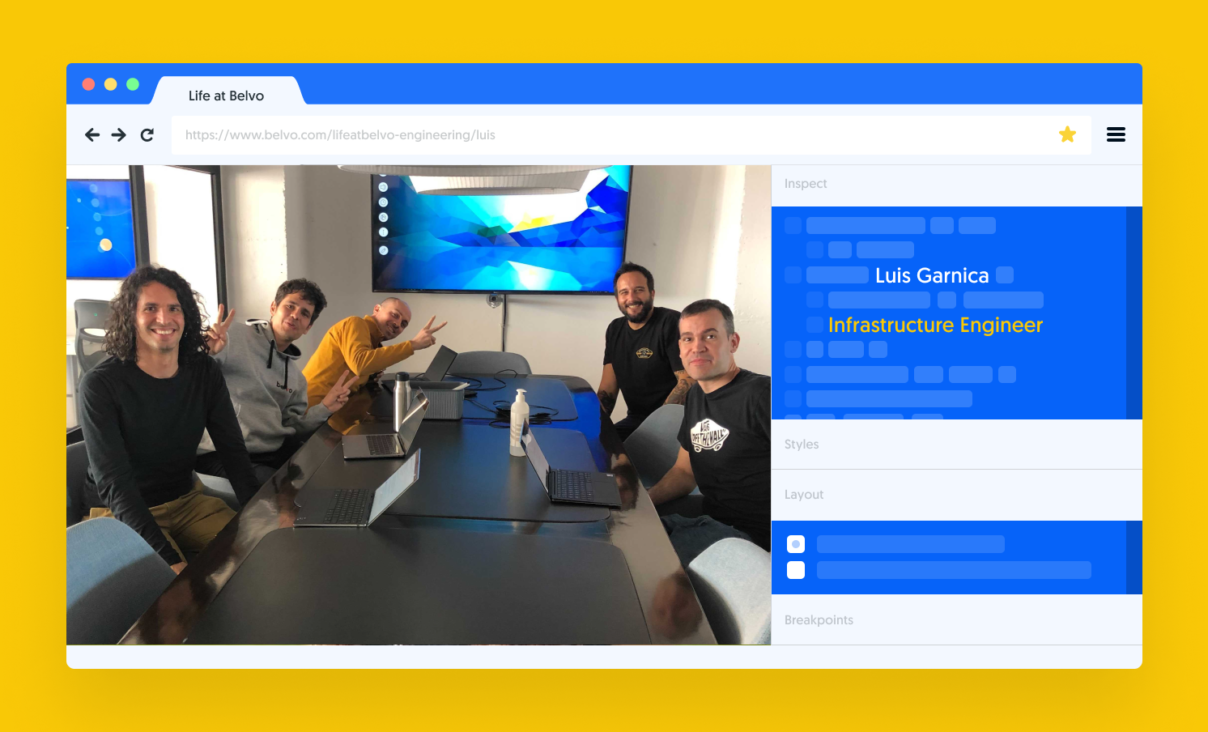
We also bond by being grateful to each other, expressing it using tacos and the best emojis in any Slack workplace.
8. What do you like the most about working at Belvo?
Its people, starting from its amazing founders to every one of each team, are the most valuable team a company can ask for.
Then, our mission is a very ambitious one, although nothing easy comes with a high reward, particularly when we’re able to solve problems no one in the industry has done before. Being part of this journey is a privilege.
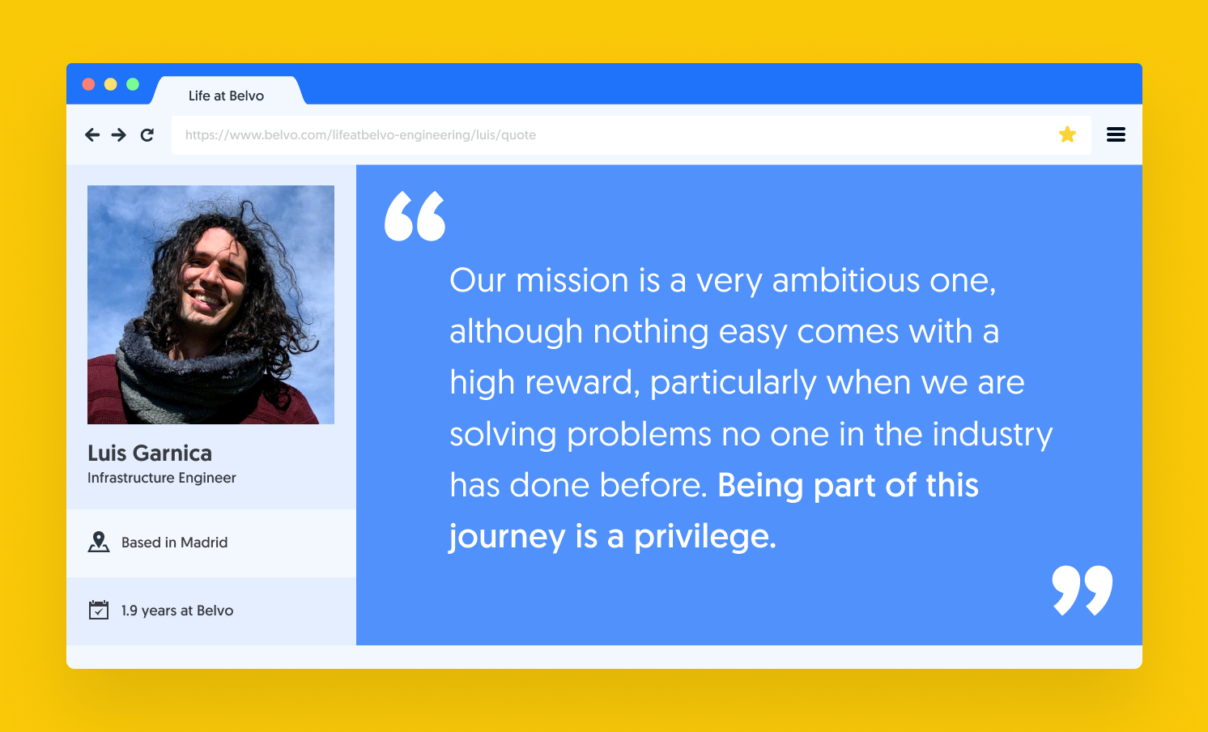
9. Where do you see yourself in three years?
I’ve always felt at my best being an IC [individual contributor]. Nevertheless, I’ve started to work more closely with our Data Acquisition team, which is the team responsible for building the connections between Belvo and financial institutions. If the adventure results in success, my profile might become a mix of infra skills plus data acquisition magic. (TLDR, my python will improve 😂)
10. Why would you recommend to someone joining Belvo?
You only live once, so why not work in an amazing company? Also, memes, culture, crème de la crème team, impressive leadership and vision.

